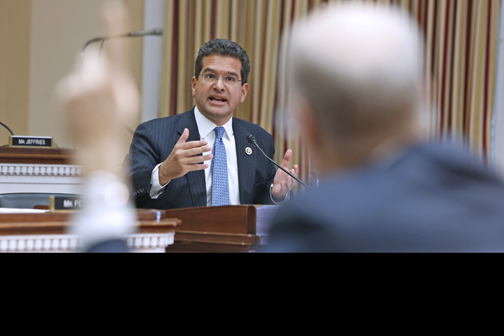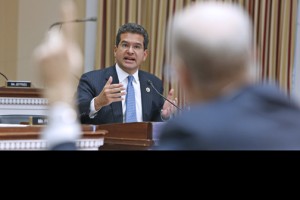Pierluisi files bill asking U.S. Treasury to guarantee loans

Resident Commissioner Pedro Pierluisi introduced a bill Thursday that would authorize the U.S. Treasury Department to guarantee repayment of principal and interest on bonds to be issued in the future by the island’s bond-issuing public entities, but only if the agency certifies that the commonwealth has “demonstrated meaningful improvement in managing its public finances.”
The “Puerto Rico Financial Improvement and Bond Guarantee Act of 2015” would require any Puerto Rico bonds guaranteed by Treasury to be used solely to meet urgent short-term financing needs like Tax and Revenue Anticipation Notes, to make capital expenditures that promote long-term economic growth (as opposed to operating expenditures), or to refinance its existing bond debt at a lower interest rate.
“As Puerto Rico’s representative in Congress, my objective has been to drive the debate in Washington, D.C. about how the federal government can help the territory manage its fiscal crisis. I am the first to criticize the government of Puerto Rico when it demonstrates a lack of fiscal discipline or takes actions that undermine its credibility with the public and the investment community,” he said.
“But responsibility for the crisis also lies squarely with the federal government, which treats the territory in profoundly inequitable fashion under spending and tax credit programs,” he added. “For this reason, the federal government has a particular obligation to provide Puerto Rico with the tools it needs to alleviate the crisis.”
This is the second bill the island’s non-voting member of Congress has introduced this year to address Puerto Rico’s fiscal crisis. In February, he filed H.R. 870 to enable the government of Puerto Rico to authorize its insolvent public corporations to adjust their debts under Chapter 9 of the federal bankruptcy code, a power that Congress has provided to all state governments.
A companion bill, S. 1774, has been introduced in the Senate. The legislation, which is supported by individuals and organizations across the political spectrum — but has also provoked staunch opposition from grassroots organizations and bondholders who have lobbied against it in recent months — would not require the federal government to spend money. The measure has been stalled in the Senate, where Republicans have held it back from moving through the legislative process. So far, only one hearing has been held on the bill.
“My allies and I will continue to do everything within our power to enact this bill into law. But the time has come to broaden the conversation in Congress beyond Chapter 9 alone,” Pierluisi said.
“That is why I am filing this carefully-calibrated bill, which seeks both to enable Puerto Rico to regain access to the capital markets on reasonable terms and to address the legitimate concerns that have been expressed regarding the need for the Puerto Rico government to get its fiscal house in order,” he added.
His bill got the support from La Fortaleza on Thursday.
Specifically, the “Puerto Rico Financial Improvement and Bond Guarantee Act of 2015” would require the Secretary of the Treasury to examine the government of Puerto Rico’s current financial management practices, to identify important gaps and weaknesses, and to make specific recommendations designed to help the government of Puerto Rico address those gaps and weaknesses.
Examples of areas to be examined include Puerto Rico’s efforts to enhance fiscal stability and operational efficiency, reduce deficits and debt, accurately estimate revenues and expenditures, collect taxes due, improve federal grant management, strengthen financial recordkeeping and reporting, increase the use of information technology, and streamline the permitting system to make it easier to start, expand, and operate businesses while protecting public regulatory goals.
The bill is modeled on prior Acts of Congress, including the New York City Seasonal Financing Act of 1975 (Public Law 94-143), in which Congress authorized the Treasury Department to establish a $2.3 billion fund for the purpose of making direct short-term loans to New York City, which was facing a major fiscal crisis and therefore was unable to obtain loans from its customary sources, said Pierluisi.
A second provision in the bill introduced by Pierluisi today would authorize the Federal Reserve to directly buy certain short-term bonds issued by government entities in Puerto Rico.
“Although the Federal Reserve has not used its Section 14 authority in the modern era, there is no principled reason why this authority should not be available to buy bonds issued by government entities in the U.S. territory of Puerto Rico, just as it is available to buy bonds issued by government entities in the states and the District of Columbia,” Pierluisi said.















